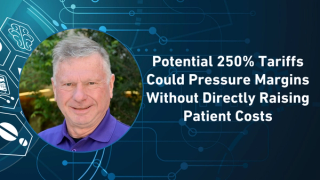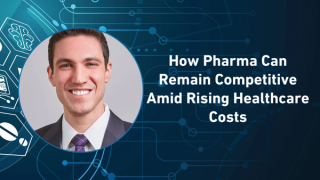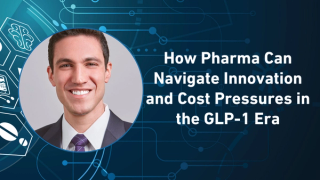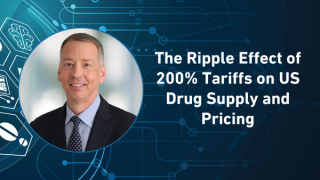
Market Access
Latest News

Latest Videos

Podcasts
More News

As FDA fast-tracks GLP-1 treatments under its new pilot National Priority Voucher program, WeightWatchers prepares to position itself to compete in the fast-evolving weight-loss drug market driven by affordability and accessibility.

Pharma Pulse: FDA Appoints Richard Pazdur as CDER Director Amid 340B Tensions and Novartis Expansion
This episode of Pharma Pulse discusses how Dr. Richard Pazdur’s appointment signals a new era for FDA drug evaluation, why hospitals are opposing the government’s 340B pilot program, and how Novartis is expanding its US manufacturing footprint with a new radioligand therapy facility in California.

Launching next year, the new CMS Innovation Center initiative—known as the GENEROUS Model—aims to align Medicaid drug prices with global standards, reduce prescription spending, and strengthen the program’s long-term sustainability through fairer state purchasing and transparent pricing rules.

Lilly announced a new agreement with the Trump administration to expand access to its GLP-1 therapies, including Zepbound and orforglipron, offering the drugs to Medicare beneficiaries for $50 per month and through Medicaid programs starting in 2026.

Pharma’s push into direct-to-patient sales is reshaping the front end of drug distribution, but wholesalers like Cencora, McKesson, and Cardinal Health remain indispensable as the backbone of the industry’s regulated, specialty, and logistics infrastructure.

As the three models converge, expect a bigger role for sales reps, minimal impact on incentive compensation, and a boon to the healthcare system.

In the final part of her Pharma Commerce video interview, Megan Wetzel, VP, product, access & affordability at CoverMyMeds, shares how the right field reimbursement model structure ensures field teams have the insights and tools they need to overcome coverage barriers and accelerate patient access to therapy.

In the third part of her Pharma Commerce video interview, Megan Wetzel, VP, product, access & affordability at CoverMyMeds, explains that by educating provider offices on payer requirements, prior authorizations, and denial trends, field reimbursement managers help streamline complex reimbursement processes and reduce treatment delays.

In the second part of her Pharma Commerce video interview Megan Wetzel, VP, product, access & affordability at CoverMyMeds, describes how high development costs, personalized treatment models, and an aging population are intensifying the imbalance.

At HLTH 2025, the entrepreneur announced a collaboration between Cost Plus Drugs and President Trump’s TrumpRx platform aimed at improving transparency, reducing drug costs, and reshaping how Americans access their prescriptions.

Aetna, Devoted Health, and UnitedHealth headline the list best Medicare Advantage insurers for next year, while Centene and Humana lead the pack in Part D prescription drug coverage.

A planned 100% tariff on branded and patented drugs from Singapore is being postponed as US and Singapore officials explore potential exemptions.

The appellate court upheld Medicare’s authority to negotiate lower drug prices under the Inflation Reduction Act, following similar rulings against AstraZeneca, Bristol Myers Squibb, and Novartis.

Amid intensified competition—and evolving IRA and PBM dynamics—leaders in the access space must now adopt a strategist mindset.

Marketed as cost-saving tools, AFPs can also strain safety-net resources.

From patent cliffs and government price controls, to self-pay models and staff-model HMOs, a look at the forces that could deflate the bubble—and those factors likely to keep it afloat a while longer.

Amid pressures on pharma to match the lowest international prices, experts warn of “policy laundering” and discriminatory impact.

Capturing insights from executives and industry experts on the biggest challenges shaping pharma today, from drug pricing pressures and access barriers to supply chain shifts, digital adoption, and evolving patient-centered care strategies.

The draft assessment finds that the popular weight loss drugs are costly but worth the price tag, while also urging for broader coverage and policy solutions.

This episode of Pharma Pulse covers the FDA’s decision to restrict bulk ingredients for compounded GLP-1 therapies, new evidence showing RSV vaccines improve cardiorespiratory outcomes in adults over 60, and pharmacy owners’ concerns over barriers to participating in the Medicaid Drug Price Negotiation Program.

By reducing waste, improving forecasting, and strengthening payer negotiations, these technologies are helping pharmaceutical companies unlock efficiency, accelerate adoption, and differentiate in competitive markets.

This episode of Pharma Pulse covers ACOG’s renewed support for COVID-19 vaccination during pregnancy, new real-world evidence confirming the safety of dapagliflozin and empagliflozin for type 2 diabetes, and a partnership between EVERSANA and Waltz Health to improve affordability and patient access.

The merger integrates EVERSANA’s commercialization services with Waltz Health’s AI-powered payer tools to address patient affordability, streamline drug access, and reduce costs for high-expense therapies such as GLP-1s.

This episode of Pharma Pulse covers a $290 million False Claims Act ruling against CVS Caremark, a new report showing most small medical practices fall short on HIPAA compliance, and research revealing why pharmacists underreport adverse drug reactions.

A federal judge tripled damages against the pharmacy benefits manager after finding it encouraged inflated Medicare drug claims and underpaid pharmacies.












